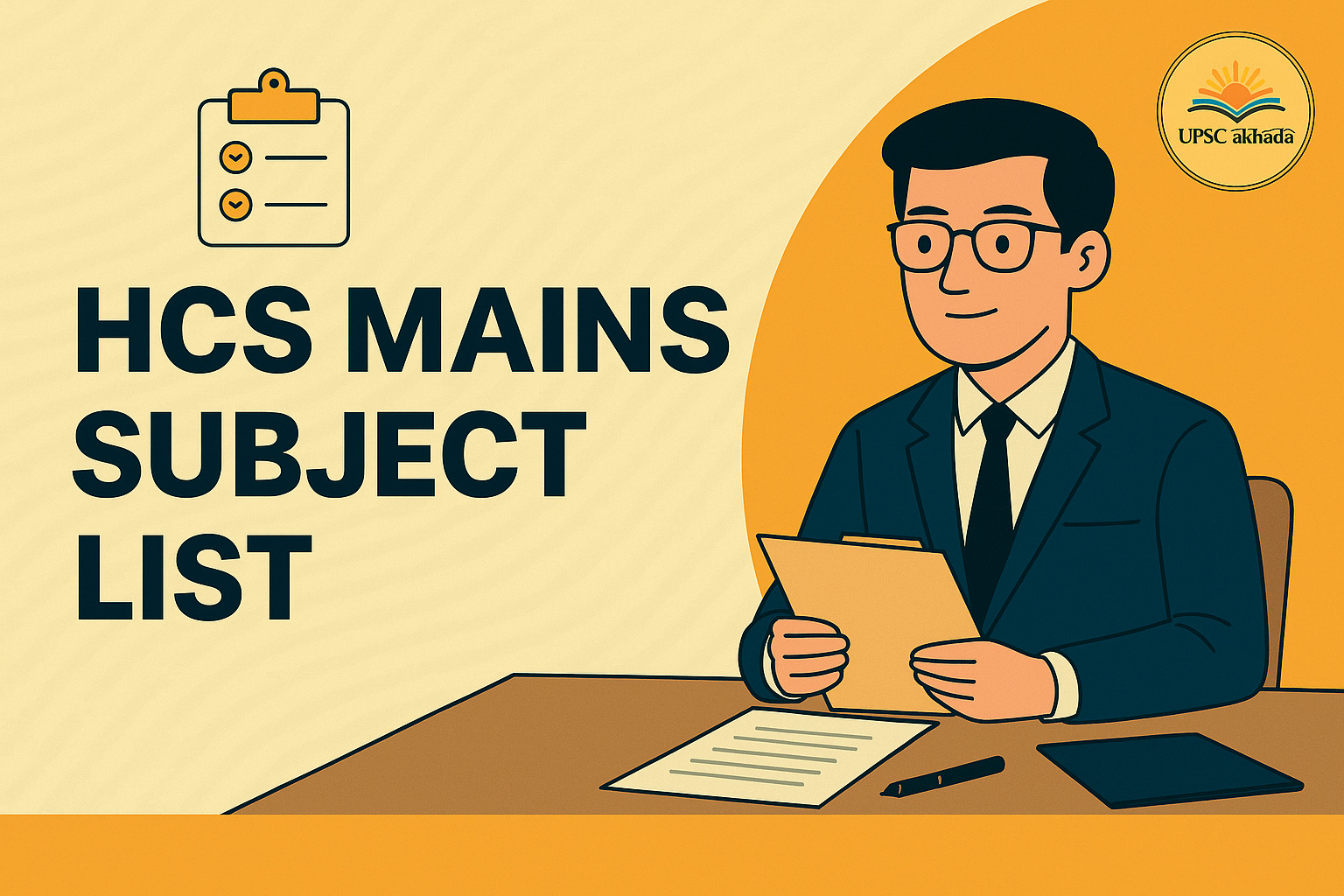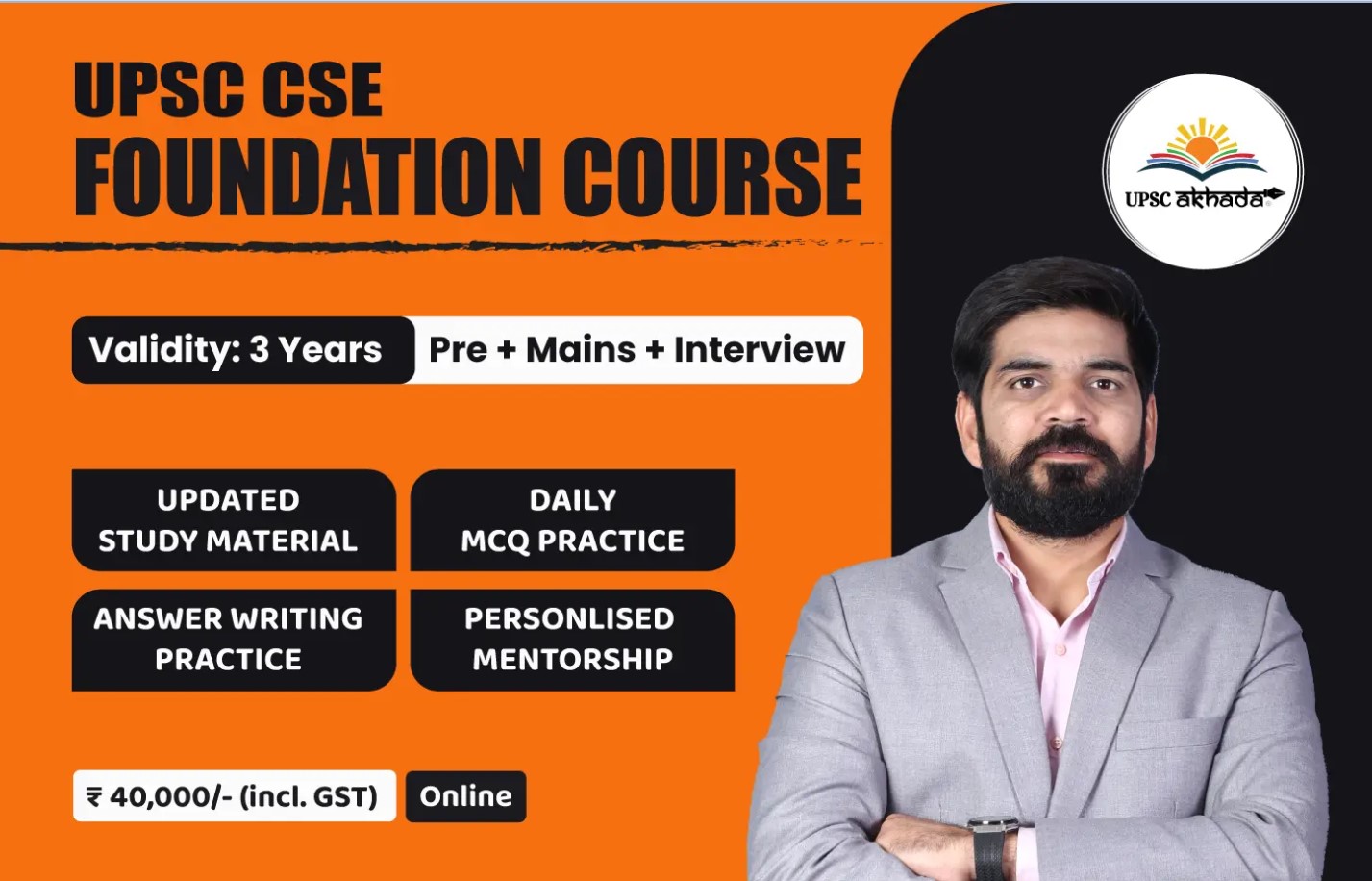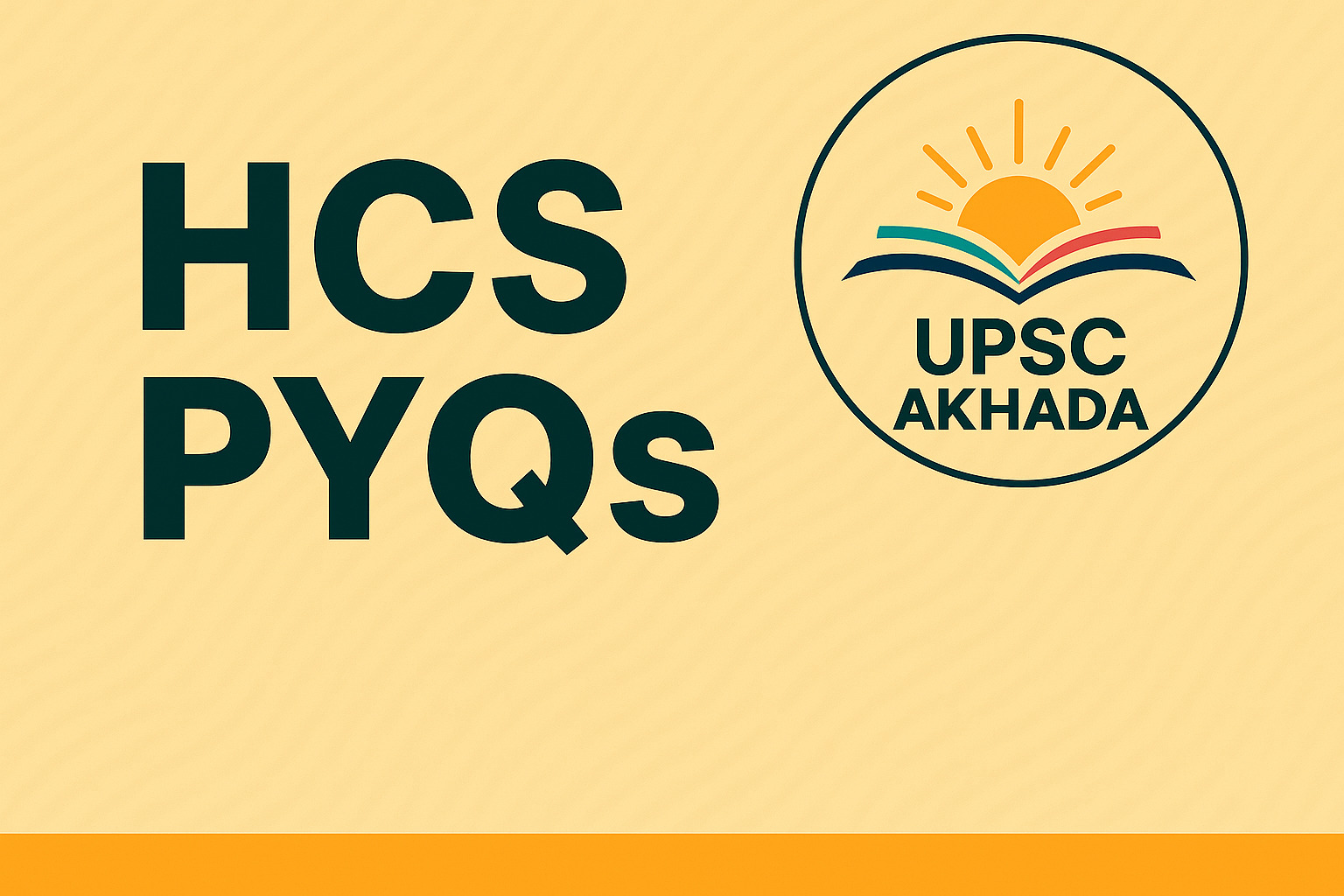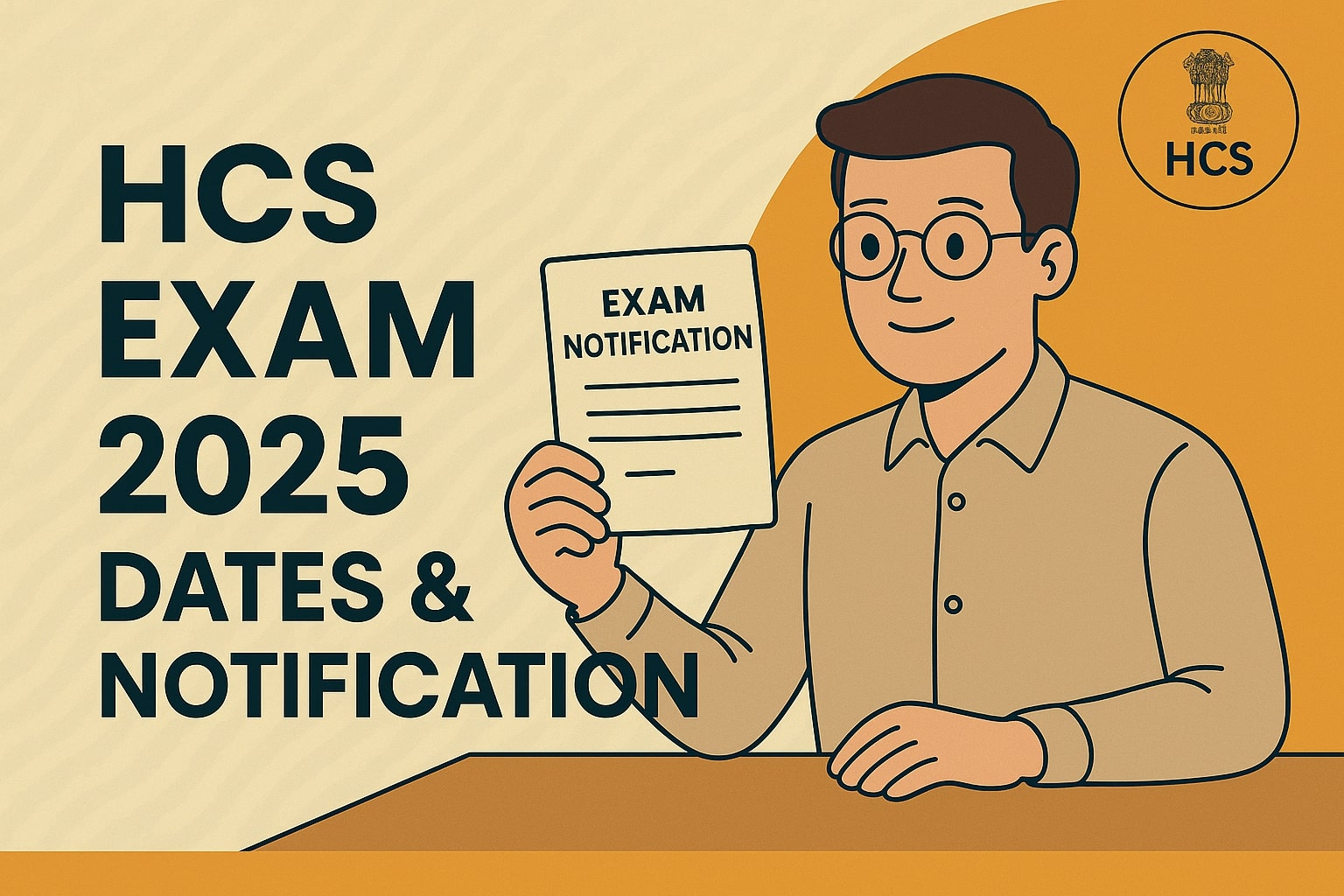The HCS Mains Exam 2025 is a pivotal stage in the Haryana Public Service Commission’s (HPSC) selection process for civil service roles. A component of the HCS Mains is its subject structure, which includes three compulsory papers and one optional subject selected by the candidate from a list of 29 optional subjects.
In this article, we provide a comprehensive breakdown of the HCS Mains Subject List, highlight the optional subject choices, compare it with the UP PCS Mains Optional Subject List 2025, and answer the most frequently asked questions.
HCS Mains Subject List 2025
The HCS Mains Exam 2025 is designed to evaluate candidates on both their intellectual capabilities and their ability to present thoughts effectively in written form. The exam consists of four papers, of which three are compulsory and one is an optional subject chosen by the candidate.
HCS Mains Subject List Compulsory Subjects
- English (including English Essay)
- Hindi (including Hindi Essay – in Devanagari script)
- General Studies
Compulsory Papers
English (Including Essay)
- This paper assesses a candidate’s proficiency in the English language through tasks such as précis writing, comprehension, grammar, vocabulary, and essay writing. It focuses on clarity, coherence, and correctness of expression.
Hindi (Including Essay in Devanagari Script)
- This paper is designed to evaluate the candidate’s proficiency in Hindi, including translation from English, précis writing, idiomatic usage, grammar, and an essay on a given topic.
General Studies
The General Studies paper is broad-based, covering:
- Modern Indian History & Indian Culture
- Geography and Polity of India
- Current National Issues & Social Relevance
- Indian Economy, Foreign Affairs, Science & Technology
- Statistical analysis, graphs, and diagrams
Also Read: HCS Syllabus
HCS Mains Optional Subject List 2025
Candidates must choose one optional subject from the 29 listed disciplines. The chosen subject should align with the candidate’s academic background and interests. The list of HCS Main optional subjects is largely modeled after UPSC standards.
List of HCS Mains Optional Subjects
-
- Agriculture: Covers agronomy, soil science, horticulture, and agricultural economics. Suitable for candidates with a background in agricultural sciences.
- Animal Husbandry and Veterinary Science: Includes animal nutrition, breeding, and disease management. Ideal for veterinary science or zoology graduates.
- Anthropology: Focuses on human evolution, cultural development, and social institutions. Favored by aspirants from the social sciences.
- Botany: Deals with plant biology, physiology, ecology, and genetics. Recommended for life sciences students.
- Chemistry: Covers organic, inorganic, and physical chemistry. Best suited for B.Sc. or M.Sc. Chemistry graduates.
- Civil Engineering: Includes structural engineering, hydraulics, and construction management. Ideal for civil engineering graduates.
- Commerce and Accountancy: Focuses on accounting, auditing, business finance, and management. Suitable for commerce and CA/CS aspirants.
- Economics: Encompasses microeconomics, macroeconomics, public finance, and international trade. Strong option for economics graduates.
- Electrical Engineering: Includes circuit theory, machines, control systems, and power systems. Ideal for electrical or electronics engineers.
- English Literature: Covers literary history, poetry, drama, prose, and criticism. Good for candidates with a degree in English or literature.
- Geography: Deals with physical geography, human geography, and map-based questions. Popular due to overlap with General Studies.
- Geology: Includes mineralogy, petrology, paleontology, and economic geology. Best for Earth Science graduates.
- Hindi Literature (Devanagari Script): Covers Hindi poetry, prose, and literary criticism. Suitable for literature students and Hindi-medium aspirants.
- History (Indian History): Focuses on ancient, medieval, and modern Indian history. Popular for overlap with GS and easy availability of resources.
- Law: Includes constitutional law, IPC, CRPC, and administrative law. Good choice for law graduates or LLB students.
- Management: Focuses on organizational behavior, HR, marketing, operations, and strategy. Ideal for MBA or management graduates.
- Mathematics: Covers algebra, calculus, geometry, and statistics. Best suited for engineering and math graduates.
- Mechanical Engineering: Includes thermodynamics, manufacturing, design, and industrial engineering. Suitable for mechanical engineers.
- Medical Science: Focuses on anatomy, physiology, pathology, and clinical medicine. Meant for candidates with MBBS or allied degrees.
- Philosophy: Deals with Indian and Western philosophy, ethics, and logic. Good for arts students and those with strong analytical skills.
- Physics: Includes mechanics, thermodynamics, electromagnetism, and quantum theory. Recommended for B.Sc./M.Sc. Physics graduates.
- Political Science and International Relations: Covers political theory, Indian politics, governance, and world affairs. Very popular due to GS paper overlap.
- Psychology: Includes cognitive, developmental, and abnormal psychology, along with therapies. Good for those with psychology background or interest.
- Public Administration: Covers administrative theory, Indian administration, and governance. Highly preferred due to practical relevance and GS overlap.
- Punjabi Literature: Focuses on Punjabi poetry, prose, and criticism. Ideal for Punjabi-medium candidates or literature graduates.
- Sanskrit Literature: Covers classical Sanskrit texts, grammar, and philosophy. Suitable for Sanskrit scholars or traditional studies background.
- Sociology: Deals with social structure, institutions, change, and Indian society. Frequently chosen for its conceptual clarity and GS relevance.
- Statistics: Includes probability, distributions, sampling, and inferential statistics. Recommended for math/statistics graduates.
- Zoology: Covers animal physiology, ecology, cell biology, and genetics. Suitable for candidates with biology or zoology background.
Also Read: HCS Mains Syllabus
Conclusion
The HCS Mains Subject List 2025 plays a pivotal role in shaping your preparation and scoring strategy. With three compulsory subjects and a wide array of 29 optional subjects, candidates must carefully analyze their strengths before making a selection. Additionally, keeping an eye on patterns followed by other state PCS exams, like UP PCS Mains Optional Subject List 2025 can help align your approach better.
Ready to boost your HPSC HCS preparation? Join UPSC Akhada online Foundation Courses today!
HCS Mains Subject List 2025 FAQs
What does the HCS Mains Subject List 2025 include?
The HCS Mains Subject List 2025 includes a total of four papers – three compulsory subjects (English, Hindi, and General Studies) and one optional subject chosen by the candidate from a list of 29 disciplines.
How can I select the best optional subject from the HCS Mains Subject List 2025?
To choose the best optional subject from the HCS Mains Subject List 2025, consider factors like your academic background, interest in the subject, overlap with General Studies, and availability of study material and coaching support.
Is there any recent change in the HCS Mains Subject List 2025?
No major changes have been announced for the HCS Mains Subject List 2025. It continues to follow the traditional structure with three compulsory papers and one optional subject, similar to previous years and aligned with the UPSC model.
Are science and engineering subjects available in the HCS Mains Subject List 2025?
Yes, the HCS Mains Subject List 2025 includes science and engineering subjects like Physics, Chemistry, Zoology, Civil Engineering, Mechanical Engineering, and more, allowing candidates from technical backgrounds to choose accordingly.
How does the HCS Mains Subject List 2025 compare with the UP PCS optional subject list?
Both HCS and UP PCS exams follow similar structures for optional subjects, but HCS Mains Subject List 2025 offers 29 subjects to choose from, whereas UP PCS revised its pattern in 2023 to include only one optional subject with two papers, aligning more closely with UPSC.













